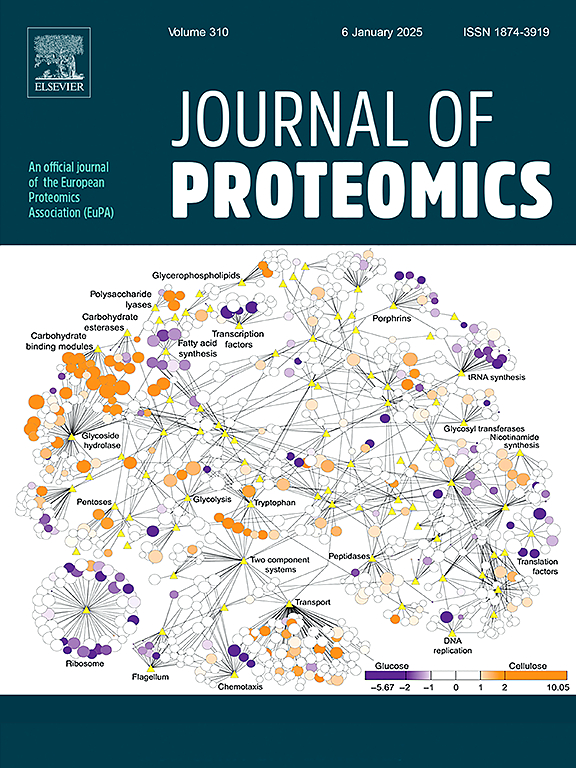Fecal metaproteomics enables functional characterization of remission in patients with inflammatory bowel disease
IF 2.8
2区 生物学
Q2 BIOCHEMICAL RESEARCH METHODS
引用次数: 0
Abstract
The gut microbiome is an important contributor to the development and the course of inflammatory bowel disease (IBD). While changes in the gut microbiome composition were observed in response to IBD therapy using biologics, studies elucidating human and microbial proteins and pathways in dependence on therapy success are sparse. Fecal samples of a cohort of IBD patients were collected before and after 14 weeks of treatment with three different biologics. Clinical disease activity scores were used to determine the clinical response and remission. Fecal metaproteomes of remitting patients (n = 12) and of non-remitting patients (n = 12) were compared before treatment and changes within both groups were assessed over sampling time to identify functional changes and potential human and microbial biomarkers. The abundance of proteins associated with neutrophilic granulocytes, and immunoglobulins significantly decreased in remitting patients. There were changes in pathways of microbial metabolism in samples from patients with remission after therapy, including an increased butyrate fermentation. Distinct changes of proteins related to gut inflammation and gut microbiome metabolism showed whether IBD remission was achieved or not. This suggests that metaproteomics could be a useful tool for monitoring remission in IBD therapies.
Significance
IBD is rising in incidence, especially in newly industrialized countries, and the microbiome is an important contributor to its pathogenesis. Despite manifold therapeutical options, achieving remission is often ineffective, and choosing new alternative drugs remains often empirical. Therefore, efficient tools for monitoring therapeutic response and assessing the effectiveness of drugs in specific patients are mandatory. In the present study, we show that the use of metaproteomics is a promising avenue to address these challenges. We observed the amelioration of inflammation and restoration of a healthy microbiome in remitting patients in contrast to non-remitting patients. Therefore, metaproteomics is a valuable tool for monitoring the therapy success in IBD.

粪便宏蛋白质组学使炎症性肠病患者缓解的功能表征成为可能。
肠道微生物群是炎症性肠病(IBD)发展和病程的重要贡献者。虽然在使用生物制剂治疗IBD时观察到肠道微生物组组成的变化,但阐明人类和微生物蛋白质和途径依赖于治疗成功的研究很少。一组IBD患者在使用三种不同的生物制剂治疗14 周之前和之后收集粪便样本。临床疾病活动度评分用于确定临床反应和缓解。在治疗前比较缓解型患者(n = 12)和非缓解型患者(n = 12)的粪便元蛋白质组,并在采样时间内评估两组患者的变化,以确定功能变化和潜在的人类和微生物生物标志物。在缓解型患者中,与中性粒细胞和免疫球蛋白相关的蛋白丰度显著降低。在治疗后缓解的患者样本中,微生物代谢途径发生了变化,包括丁酸盐发酵增加。与肠道炎症和肠道微生物代谢相关的蛋白质的明显变化表明IBD是否得到缓解。这表明宏蛋白质组学可能是监测IBD治疗缓解的有用工具。意义:IBD的发病率正在上升,特别是在新兴工业化国家,微生物群是其发病机制的重要贡献者。尽管有多种治疗选择,实现缓解往往是无效的,并选择新的替代药物往往是经验。因此,监测治疗反应和评估特定患者药物有效性的有效工具是必要的。在目前的研究中,我们表明使用宏蛋白质组学是解决这些挑战的有希望的途径。与未缓解的患者相比,我们观察到缓解患者的炎症改善和健康微生物组的恢复。因此,宏蛋白质组学是监测IBD治疗成功的一个有价值的工具。
本文章由计算机程序翻译,如有差异,请以英文原文为准。
求助全文
约1分钟内获得全文
求助全文
来源期刊

Journal of proteomics
生物-生化研究方法
CiteScore
7.10
自引率
3.00%
发文量
227
审稿时长
73 days
期刊介绍:
Journal of Proteomics is aimed at protein scientists and analytical chemists in the field of proteomics, biomarker discovery, protein analytics, plant proteomics, microbial and animal proteomics, human studies, tissue imaging by mass spectrometry, non-conventional and non-model organism proteomics, and protein bioinformatics. The journal welcomes papers in new and upcoming areas such as metabolomics, genomics, systems biology, toxicogenomics, pharmacoproteomics.
Journal of Proteomics unifies both fundamental scientists and clinicians, and includes translational research. Suggestions for reviews, webinars and thematic issues are welcome.
 求助内容:
求助内容: 应助结果提醒方式:
应助结果提醒方式:


